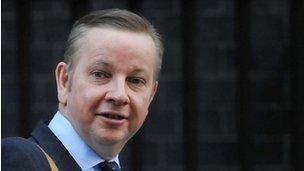Curriculum changes pushed back to 2014
- Published

Michael Gove wants England's curriculum to compete with leading international school systems
The overhaul of the national curriculum in England is to be delayed by a year, the education secretary has confirmed.
A written statement on Monday says the review of core subjects will now be implemented in autumn 2014.
"The longer timescale will allow for further debate with everyone interested in creating a genuinely world-class education system," said Mr Gove.
A report from the review's expert panel proposes that a wider range of subjects should be compulsory to the age of 16.
Labour's education spokesman, Stephen Twigg, has written to Mr Gove offering cross-party talks for a consensus over the future shape of the school curriculum.
"The national curriculum should be placed above party politics, so we can give confidence to teachers and head teachers that ministers will not constantly chop and change the curriculum to fit their own ideology," said Mr Twigg.
Global standards
The pushed-back timetable means that instead of introducing changes for English, maths, science and PE in 2013, the revised curriculums for all subjects will be introduced in 2014.
However, by the time the revised national curriculum is in place in 2014, it will almost certainly only be compulsory for a minority of secondary schools, as academies have the right to "disapply" the curriculum.
At present, more than 40% of secondary schools are academies or in the process of converting - and academies, with flexibility over the curriculum, are set to become the majority in 2012.
The review, launched in January, has been examining the curriculums used at primary and secondary levels, with particular attention to whether school standards are keeping up with highest-performing education systems around the world.
Mr Gove points to the international school league tables, based on the Pisa test results, to argue that England's standing has "deteriorated significantly".
The statement from the education secretary highlights advances by pupils in Singapore, Hong Kong, Poland, Alberta in Canada and Massachusetts in the United States.
"If our schools, and young people, are to become internationally competitive again we must learn from the best in the world," says Mr Gove's statement.
Spoken English
The report of the review's expert panel, external, which will be subject to further consultation and discussion, argues for a broader curriculum to the age of 16, "built around a core of academic subjects".
It proposes that currently optional subjects such as geography, history, modern foreign languages, design and technology and the arts should be studied by pupils until the age of 16.
It suggests that the development of oral language skills should be a feature of the new curriculum.
The report also emphasises the importance of clarifying for parents what is really meant by the national curriculum - as opposed to parts of the wider school curriculum.
It also raises the prospect of reconfiguring the current system of key stages, which are the milestones for pupils' progression through the school system.
It suggests that Key Stage 2 - for seven to 11 year olds - is too long and could be broken into two stages. Key Stage 4 - for 14 to 16 year olds - it suggests could be lengthened to three years.
There is also a proposal to end the system of measuring progress by levels, which the report suggests can inhibit rather than drive development.
Mr Gove's statement also acknowledges that the concerns raised about examiners and exam boards needed to be taken into consideration "in parallel with changes to the secondary curriculum".
Chris Husbands, director of the Institute of Education, University of London, supported this as a "timely and important opportunity" to examine the relationship between the curriculum and the exams system for 14 to 16 year olds.
"We must make sure there is a real curriculum at Key Stage 4 rather than just a mechanism for assessment. You can't think about curriculum in isolation from how it's assessed," said Professor Husbands.
Stephen Twigg has described the expert panel's findings as a "serious piece of work" and has backed suggestions such as extending the current Key Stage 4 to become a three-year period of study.
The delayed implementation of the curriculum review has been welcomed by head teachers' leader Brian Lightman.
"It is encouraging to hear the Department for Education recognise that rushed and poorly-debated curriculum change creates chaos for schools by allowing them too little time to prepare," said the ASCL general secretary, Mr Lightman.
But he regretted that a similar pause before implementation was not being allowed for changes to the GCSE system.
Mary Bousted, head of the ATL teachers' union, said: "The national curriculum is such an important part of our education system that it is wholly sensible to consider change carefully and fully involve the teaching profession in its redevelopment."
Mr Gove's use of international comparisons was attacked by Chris Keates, leader of the NASUWT teachers' union.
"A common feature of announcements by the Secretary of State is the peddling of the myth that standards are declining. This announcement is no different.
"Almost every education policy statement is premised on misinformation designed to mislead parents and the public, in order to justify the changes proposed.
"By now it is hard to imagine that there is anyone left who takes seriously the Secretary of State's use of international data.
"It is now well understood that instead of using the information systematically and objectively to support developments in education, the coalition government continues its undignified scouring of the globe, cherry-picking parts of other countries' education systems to justify the reforms it has already decided to introduce," she said.